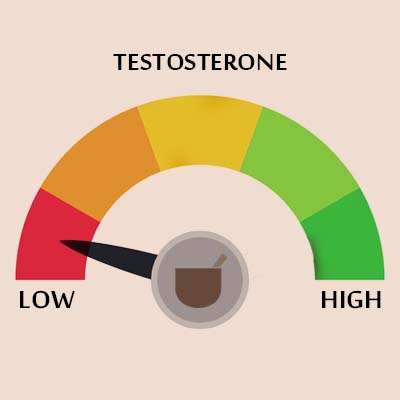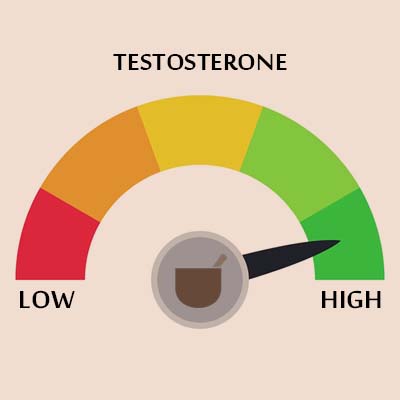Health Care
What Is Testosterone

Testosterone is slowly becoming the new buzz word all around the world. Many people are concerned about their falling testosterone levels all over the world. However, did you know what exactly testosterone is and why it is so important? Let us take you through this blog and tell you about its role in the body.
What Is Testosterone?
Testosterone is a hormone that is essential for the development and maintenance of male reproductive system as well as secondary characteristics such as muscle mass and body hair. It also has a significant impact on bone density, red blood cell production, and overall health. Although testosterone is commonly associated with men, women also produce testosterone, however in smaller amounts.
What Is The Role Of Testosterone?
Testosterone is a fundamental component for the production of male characteristics. It is produced in the testes, while the adrenal glands also contribute to its production. This influential hormone impacts a myriad of bodily functions, encompassing the physical, sexual, and psychological aspects of a man’s life.
Testosterone boosts the growth of muscles and bones, fostering the advancement of lean muscle mass and increases overall strength. Additionally, it actively promotes the formation of red blood cells, which helps in transporting oxygen throughout the body. Therefore, having optimal testosterone levels are pivotal for enhancing athletic performance and energy. Moreover, beyond its physical properties, testosterone also has a significant impact on mental and emotional states. The attainment of healthy testosterone levels are associated with better memory and concentration.
Is Testosterone A Steroid?
Many individuals get confused by testosterone and associate it with steroids. This, however, is a myth. Testosterone and steroids are two very different substances and it is critical to understand how they are related. Athletes use steroids to boost their athletic performance, which affects hormones like testosterone.
Steroids are often used by athletes for gaining muscle and increasing their physical performance. They are synthetic variants of testosterone known as anabolic steroids. These synthetic chemicals have been chemically designed to boost their anabolic potential, resulting in increased muscle mass, weight, and strength. On the other hand, natural testosterone is responsible for numerous critical tasks such as reproductive organ development, sexual excitement, bone density, muscle growth, red blood cell production, etc. It functions as an endogenous hormone and is synthesized naturally within the body.
What Are The Normal Testosterone Levels?
The normal level of testosterone in the body depends upon thyroid function, protein status, and other factors. According to research, a testosterone level of at least 300 nanograms per deciliter (ng/dL) is considered normal for a man. But, for women aged 19 and above normal testosterone levels range from 15 to 70 ng/dL.
However, certain factors affect testosterone levels that are essential for maintaining overall health and well-being –
- Age: Testosterone levels naturally decline with aging. Male testosterone production normally falls progressively between the ages of 30 and 40, a condition known as and pause. This deficit can result in a variety of symptoms, including muscle loss, weariness, and diminished libido or sex desire.
- Lifestyle: Lifestyle choices can have a huge impact on testosterone levels. Excessive alcohol intake can lower testosterone levels similarly regular exercise, including strength training, has been shown to improve testosterone production.
- Diet: A nutritious diet can have a significant impact on testosterone production. Regular incorporation of a diet rich in healthy fats is linked to higher testosterone levels. In addition, taking enough zinc, vitamin D, and magnesium is important for testosterone production.
- Stress: Chronic stress harms testosterone levels. Severe stress increases the production of cortisol, a hormone that competes with testosterone. This imbalance can lead to decreased testosterone production.
- Sleep: Adequate sleep is critical for hormone regulation, including testosterone. Lack of quality sleep or sleep disorders can disrupt hormone production and decrease testosterone levels.
- Body composition: Body fat percentage can affect testosterone levels. Excess body fat, especially around the waist, is associated with lower testosterone levels. Maintaining a healthy weight through proper diet and exercise can improve testosterone production.
Symptoms of Low Testosterone

Low levels of testosterone can have a significant impact on overall health and well-being, leading to a range of symptoms:-
- Fatigue and Low Energy Levels: Men with low testosterone frequently experience tiredness and a significant drop in energy levels. This can emerge as an overall feeling of weakness and a lack of motivation to engage in any physical or mental activity.
- Decreased Sex Drive: Testosterone plays a significant role in sexual desire and function. Men with low testosterone may notice a reduction in their libido and a decline in sexual performance. They may also experience difficulties in achieving or maintaining erections.
- Loss of Muscle Mass and Strength: Testosterone is essential for muscle mass and strength. Men with testosterone deficiencies may experience loss of muscle mass, reduced overall strength and difficulty in maintaining muscles.
- Increased Body Fat: Low testosterone levels can contribute to an increase in body fat. Men with low testosterone may notice a gradual accumulation of fat and a decrease in muscle definition, leading to changes in body composition.
- Mood Swings and Depression: Testosterone influences mood and emotional well-being. Low testosterone levels can contribute to constant irritation, mood swings, and feelings of depression. Men may experience a decline in overall mental well-being and a lack of enthusiasm.
- Decreased Bone Density: Testosterone helps in maintaining bone density and strength. Inadequate testosterone levels can lead to reduced bone density, making men more susceptible to fractures and osteoporosis.
Symptoms of High Testosterone Levels
As per modern science, a testosterone level of above 950 ng/dL is considered as high level of testosterone in men. It is important to maintain a healthy balance in the level of testosterone. Having high level of testosterone may also cause difficulties in overall health –
- Increased Libido – Increased libido is also an indication of elevated testosterone in men. Men may experience higher arousal as a result of increased testosterone levels. Since testosterone assists in sperm production, men should consult their doctor if they observe any changes in their libido.
- Excessive Body Hair Growth – Excessive growth of hair on the face and body can also be caused by increased testosterone levels. Testosterone stimulates the growth of body hair due to which men with high testosterone levels, may see greater stubble on their faces, thicker arm hair, chest hair, and even pubic hair.
- Promotes Weight Gain – Testosterone is one of the most vital hormones for the development of male body. When the level of testosterones increases, men may experience weight gain without changing their diet or exercise program.

What Are The Treatments Available To Balance The Level Of Testosterone?
Testosterone levels depend on various factors. However, particularly men as they age experience a variety of symptoms due to hormonal imbalance. Fortunately, there are diagnosis and treatment options available to address this hormonal imbalance and restore vitality.
- Testosterone Replacement Therapy (TRT ) – This therapy aims to increase testosterone levels to restore balance. TRT can be administered through injections, patches, gels, or pellets, allowing for personalized treatment based on individual preferences and needs.
- Lifestyle Changes – Certain lifestyle modifications can help in dealing with low testosterone levels. Regular exercise, a balanced diet, stress reduction techniques, and sufficient sleep are all factors that can positively impact testosterone levels.
- Natural testosterone booster – Certain ayurvedic medications are known to be effective testosterone boosters. Shilajit is one such Ayurvedic product that is known to boost testosterone, enhance strength, stamina and much more. This is one such natural method to balance the level of testosterone.
Final Thoughts
Testosterone is a powerful hormone that greatly impacts human health. Its function goes beyond reproduction, influencing muscle development, bone density, cognitive abilities, and emotional well-being. Maintaining optimal testosterone levels is crucial for overall health and vitality.
Disclaimer
It is critical to remember that each individual has a unique and unparalleled body type, and the way substances react might vary significantly between individuals. It is strongly advised to seek the advice of an experienced healthcare professional who can properly run the necessary tests and offer suitable treatment options. It is critical to note that only a skilled medical professional can accurately measure your testosterone levels and provide expert advice towards the most appropriate course of action to adequately address the root cause of the problem.
